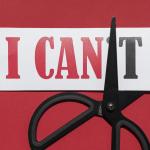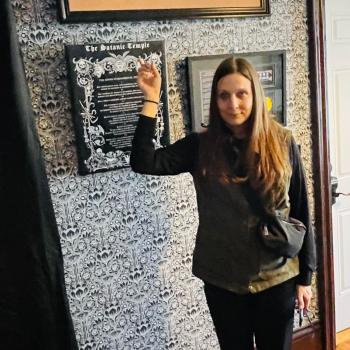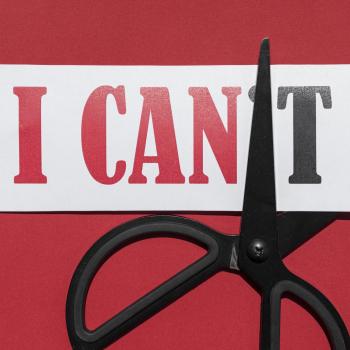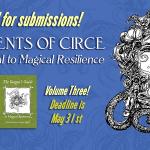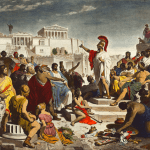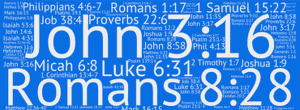
Recently, the news reported that former U.S. president Donald Trump is selling Bibles. Get your corrupted Bible here! He said every American should have them. This is probably the most intelligent thing he’s ever publicly said. However, he shoved his foot in his mouth immediately afterwards, by saying “Make America Pray Again.” Um, no thank you, not from that book or any of its versions.
However, yes the Bible should probably be on hand, whether in your house or at your fingertips on the computer. I know, you’re thinking, “I’m Pagan, I tossed it out a long time ago” or “what will I use to hold up my table?”
Think about this for a minute. If you don’t know what’s in the Bible, you can’t defend yourself when radicals try to use it against you. This is something my elder, the Rev. Foxxy (Sher) Pullen has said so many times to her students.
Not long after I joined, the Unitarian Universalist Congregation at Montclair, NJ offered a Bible Study class. I thought maybe it would be interesting to take. I had just finished their book study on “The Tain” translated from the Irish Epic Tain Bo Cuailnge. Taking this first class was a no brainer, it’s about as Druidic as you can get. Because it’s our lore, it has far more hints packed into it than a “story book” normally has. I really enjoyed the class and learned a lot. The same teacher, the Rev. Scott Sammler-Michael, senior co-minister of UU Montclair, was leading the Bible study. So, I gave it a try.

Due to the COVID-19 pandemic, the Bible Study class was conducted entirely through Zoom. Actually, Pullen and I took it together as she lives in Ohio. I grabbed a Bible from my town library before the government shut them down as well. The time frame that I had the Bible grew very long. Soon after I checked out that book, the government shut everything down including the library.
Yes, I had a Bible, most kids had one by Confirmation. I actually have five Bibles now. I had to lug the Good News Bible to CCD (the Confraternity of Christian Doctrine) class every week. Gods forbid we came to class without it. However, I do not recall ever opening it in class or using it for homework. Funny how controlling the Catholic Church is with it’s lessons. We never referenced it in school or used it by my family either, except telling my brother and I how important it is. We renovated our bedroom closets and it ended up packed away in the attic somewhere. I have yet to find it or the other two gifted to me.
Recently, I found two free copies at a Thrift Shop: the New International Version and the New Revised Standard Version. Both of these copies, Sammler-Michael recommends. Actually, he prefers the study Bibles of the NIV and NRSV if possible. He suggests his students consider getting a study Bible such as Oxford, New Interpreters, Harper Collins or the People’s Bible. Study Bibles have footnotes by scholars that explain the scriptures in detail. My local library and the chain of libraries in my area have the Harper Collins Study Bible and possibly a few others.
I’m going to donate one of the free ones I “found” back to UU Montclair. I just haven’t decided which one yet. And on that note, a brand new study Bible costs $34 on Amazon. Additionally, you can get a used one for less than $5. These are significantly bigger than a regular Bible since they have extra information on the scriptures.
There is no reason to purchase a Bible for $60. In fact for those who feel keeping a Bible even for reference is unthinkable, there are versions on the web. Just like anything else online though make sure its a good source. Oh, and they are free. Websites such as BibleGateway.com and Bible.com to name two of them, offer many versions. Sometimes it’s worth comparing the different interpretations. This is something we have done regularly in class. If someone has a different version than the translation requested he will ask them to read that verse to us. It’s interesting to see the differences and compare them.
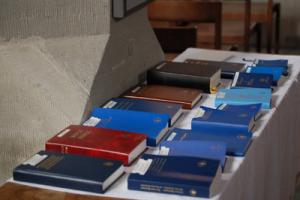
There are so many versions and some are very slanted such as the King James Bible. As with anything else, you need to be aware of what you read and not buy-into every word or concept. In fact, it’s very much like reading Pagan histories: Consider the author, his/her perspective and agenda before you accept all the information at face value.
Pullen said she prefers the Jewish or Hebrew Bible — the Torah, so long as we’re in the old testament. The Torah is the first five books in the Christian Bible. According to Pullen, that version has been consistent across time. She explains, like a bard’s lesson, it is repeated absolutely perfectly. Errors of misplacing a vowel cannot change the Hebrew word from haloed to horned such as Moses on the mountain.
For those who don’t know, the scriptural scrolls read in Jewish temples and schouls only show consonants. You have to know what vowels belong where to pass your bar or bat mitzvah (the Jewish form of becoming an adult in the religious community.) The Jewish version is not re-translated over and over again which holds the nuances of some stories. These are lost in many if not most of the Christian versions.

I’m actually a bit excited to be taking another Bible study class, which starts this week. It’s titled Have it Your Way! We suggest the scriptures we will be looking at for class. The minister picks them apart line by line with us trying to figure out the real meaning. The very end of the class description Sammler-Michael wrote, “[… ] help us reclaim the Scriptures to better serve our progressive mission!”
Exactly, we cannot let Bible thumpers get away with changing the meaning. The term witch, in Exodus in the KJV Bible is deliberately misinterpreted. Not that I can entirely blame him, quoted Pullen. Apparently, his archrival and cousin tried to take the throne by any means possible. He also happened to be the head witch of Scotland. King James with his power dictated how the bible is translated into English, and as far as one knows, made those changes. The problem is twofold: the change was situational, and it has lasted 300 plus years. “Thou shalt not suffer a poisoner to live” is the correct wording. No one wants a poisoner for a neighbor.
Speaking of which, nowhere in the Bible does it say being LGBTQIA+ is wrong. “Reading Scripture with Pride,” an interfaith panel discussion, did what it was meant to do. It enlightened people on what the Bible verses actually mean. According to Sammler-Michael, the Bible can mean anything that we want. We should tread carefully, he said during the panel. Rabbi David Greenstein pointed out that assumptions rule interpretation. He explains in his words, the scripture Leviticus, noted in the video linked above, near 1:13 minutes.
This is why Pagans especially need to have knowledge of this book. We need to be ready to respond to those who want to use it against us. So use an open mind and maybe we can educate those who think they already know everything in that book.
We also need to stand with the LGBTQIA+ community. In order to be a better ally you must be knowledgeable in such books. Many are Pagan because not only does it feel right, but their former houses of worship do not accept them. Accepting one another is a first step, “fighting” alongside is the next. So go get a cheap or maybe a free Bible and “tear it apart” word by word that is. Take a Bible study class at your local UU, as Pullen says never stop learning.
See also: My Pagan View Of The Deities — What God Is And What They Are Not and A UU Pagan understanding of the Christian’s belief of sin & salvation


